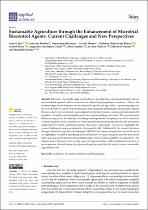| dc.contributor.author | Gokul, Arun | |
| dc.contributor.author | Mabaso, Jabulani | |
| dc.contributor.author | Klein, Ashwil | |
| dc.date.accessioned | 2023-06-20T07:43:12Z | |
| dc.date.available | 2023-06-20T07:43:12Z | |
| dc.date.issued | 2023 | |
| dc.identifier.citation | Gokul, A. et al. (2023). Sustainable agriculture through the enhancement of microbial biocontrol agents: Current challenges and new perspectives. Applied Sciences, 13(11), 6507. https://doi.org/10.3390/app13116507 | en_US |
| dc.identifier.issn | 2076-3417 | |
| dc.identifier.uri | https://doi.org/10.3390/app13116507 | |
| dc.identifier.uri | http://hdl.handle.net/10566/9122 | |
| dc.description.abstract | The future of pesticide usage in agriculture is uncertain due to its unsustainability, adverse
environmental impacts, and its association in enhanced phytopathogen resistance. Hence, this
situation urges the development of new sustainable practices in agriculture. A promising approach
involves endophytes, which are non-pathogenic microorganisms inhabiting the interior parts of plants.
However, due to the vast diversity and complexity of plant microbiomes, a major gap has formed with
regards to endophytic research and its application in phytopathogen biocontrol. The gap has mainly
been increasing due to the difficulty of isolating underrepresented endophytes and due to limitation
of previous genetic tools availability to further research and understand plant-microbe interaction,
endophytic biocontrol capabilities and their biocontrol compounds. | en_US |
| dc.language.iso | en | en_US |
| dc.publisher | MDPI | en_US |
| dc.subject | Biotechnology | en_US |
| dc.subject | Agriculture | en_US |
| dc.subject | Phytopathogens | en_US |
| dc.subject | Diversity | en_US |
| dc.subject | Food security | en_US |
| dc.title | Sustainable agriculture through the enhancement of microbial biocontrol agents: Current challenges and new perspectives | en_US |
| dc.type | Article | en_US |

